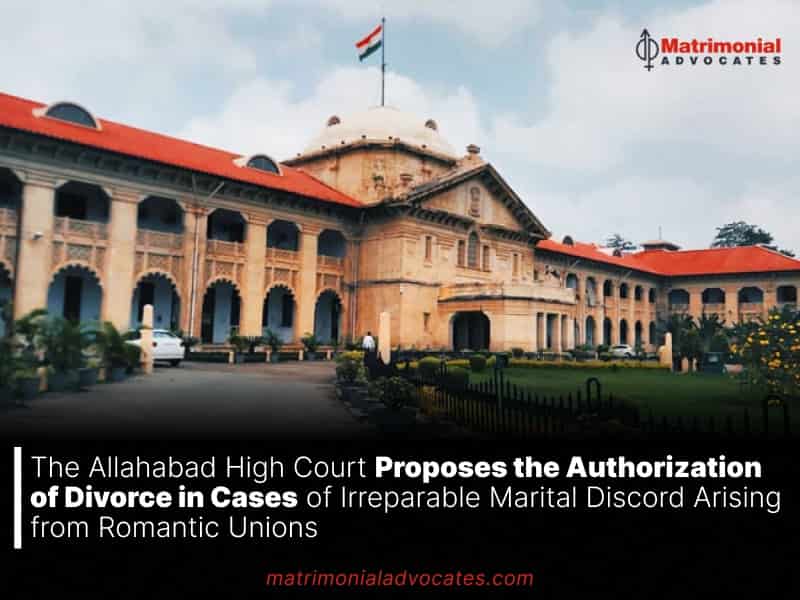
The High Court directed the Union of India and the Law Commission to consider the demand for including irretrievable breakdown of marriage as a ground for divorce under the Hindu Marriage Act.
On Thursday, the Allahabad High Court articulated observations concerning matrimonial unions formed through romantic affiliations, delineating them as contracts easily entered into yet frequently leading to marital discord with commensurate ease. The division bench, comprised of Justices Vivek Kumar Birla and Donadi Ramesh, underscored the imperative of amending the provisions for divorce delineated within the Hindu Marriage Act to address contemporary exigencies.
In particular, the Court enjoined the Union of India to contemplate amendments to the Hindu Marriage Act, guided by the pronouncements of the Supreme Court in 2006 advocating for the recognition of irretrievable breakdown of marriage as a valid ground for divorce. Reflecting upon the inception of the Hindu Marriage Act in 1955, the Court discerned a palpable shift in societal norms pertaining to matrimonial bonds since its enactment. This metamorphosis was ascribed to various factors including heightened levels of education, financial independence, the dissolution of caste barriers, modernization, and the pervasive influence of western cultural paradigms.
Furthermore, the Court accentuated the evolving fabric of societal structure towards enhanced individualism, resulting in a concomitant diminishment in the reliance upon emotional interdependence within matrimonial relationships.
“Whether it is a love marriage or is an arranged marriage, all such factors do affect the relationship between the two. However, needless to say that to every action, there is equal reaction. Easily entered marriages like love marriages are also easily resulting in matrimonial dispute between the two. No matter, who is responsible for the same. The parties are not willing to continue such relationship or atleast one party starts living separately,” the Court remarked.
The judges noted that these “facts” were clearly apparent based on their experiences in adjudicating such disputes.
Easily entered marriages like love marriages are also easily resulting in matrimonial dispute.”“
Allahabad High Court
During the adjudication of an appeal brought by a doctor with a distinguished service record in the Indian Army, the Court made the following observations. The appeal challenged the decision of the Family Court to reject the doctor’s petition for the dissolution of his marriage to his wife, who is also a senior medical practitioner.
The matrimonial union, being the second for both parties, was solemnized in 2007. Allegedly, six years prior to the husband’s 2015 application for divorce, the wife ceased cohabitation, citing allegations of cruelty.
The Family Court dismissed the husband’s petition, prompting recourse to the High Court in 2019. The wife, choosing not to participate in the proceedings, was consequently dealt with ex parte.
The crux of the husband’s contention before the High Court centered on the assertion that the prolonged separation from his wife constituted mental cruelty.
Upon careful consideration of the submissions, the Court expeditiously acknowledged the longstanding judicial recognition by the Supreme Court of irretrievable breakdown of marriage as a valid ground for divorce. Specifically, the Court cited the 2006 precedent of Naveen Kohli Vs. Neelu Kohli, wherein the apex court deliberated on the prospect of incorporating irretrievable breakdown of marriage as a legal basis for divorce.
“On one hand, the law recognises desertion of a petitioner for a continuous period of not less than two years immediately preceding the presentation of the petition as one of the grounds for grant of divorce, whereas on the other hand, it is not understandable as to why the ground of irretrievable break down is not being recognized as one of the grounds, when the parties are living separately for so many years and in some cases, for decades together,” it added.
Nevertheless, the High Court lamented the lack of progress in this regard, despite the passage of nearly two decades since the pronouncement of the apex court on this pivotal matter.
Furthermore, the Court conveyed that in numerous cases, the marital union between individuals endures merely in title. The Court elucidated that because of this situation, the Supreme Court has consistently asserted that the perpetuation of such unworkable marital ties constitutes nothing less than mental cruelty inflicted upon the parties concerned.
“To our mind, irretrievable break down is an assessment of circumstances prevailing in lives of the parties to the marriage and if proved, would amount to mental cruelty,” it said.
In this case, the Court noted that the wife’s prolonged absence clearly shows she’s not interested in maintaining the marriage.
The Court also said that the marriage has broken down irreparably, causing a lot of emotional pain to the husband because it’s no longer working and has become emotionally empty.
“On that note, divorce can be granted,” it said, while allowing the appeal and granting a decree of divorce in favour of the husband.|
At the same time, the Court directed the Registrar (Compliance) to send a copy of this judgment to the Secretary of the Ministry of Law and Justice, Department of Legal Affairs, Government of India, and to the Law Commission. This instruction aims to assist in reviewing the issue in line with the observations made by the highest court in the case of Naveen Kohli and relevant legal precedents.





